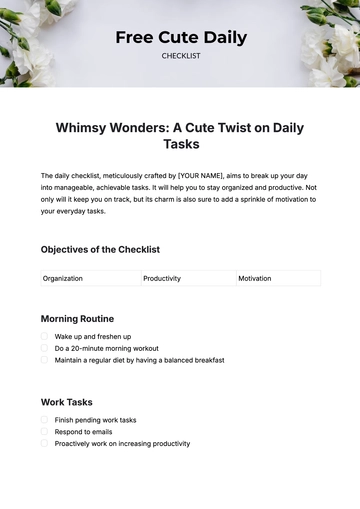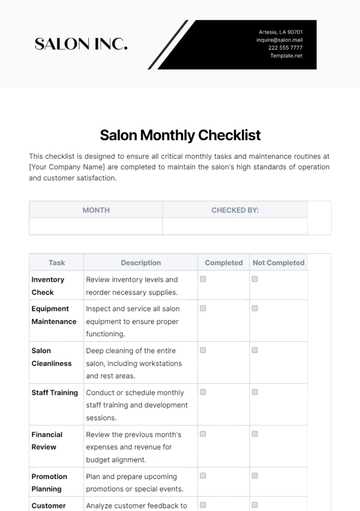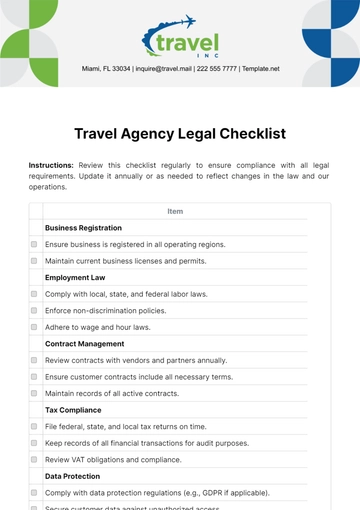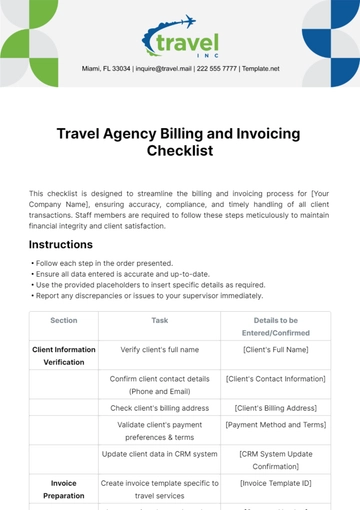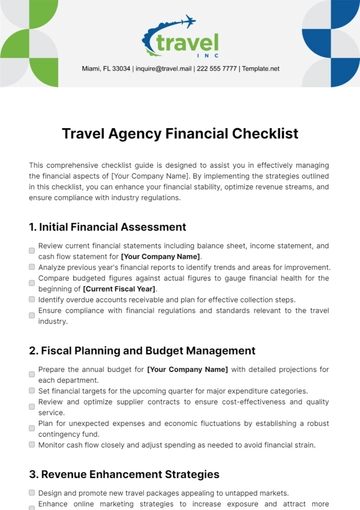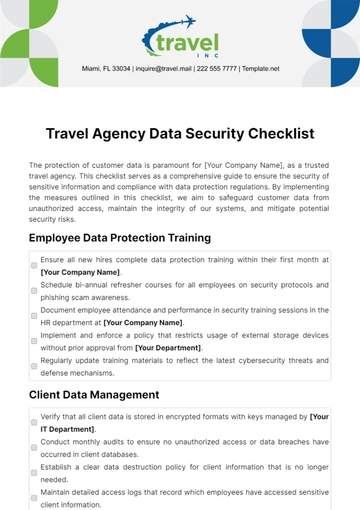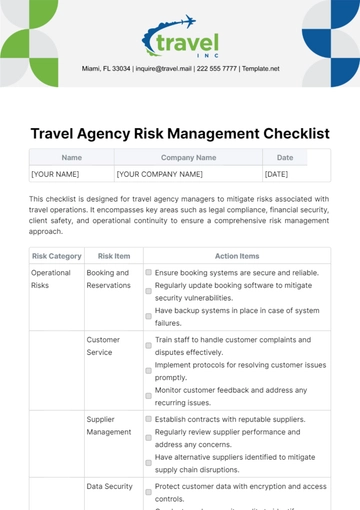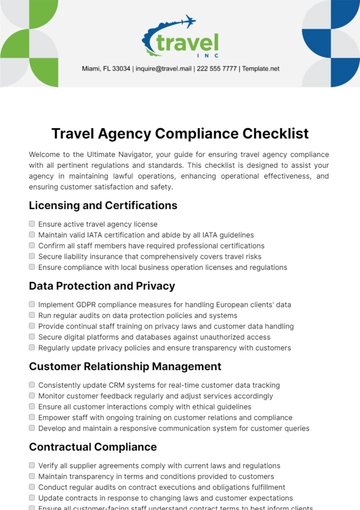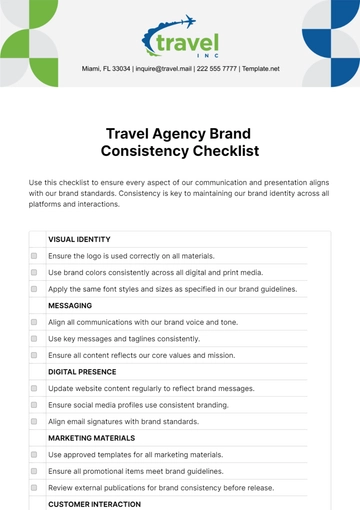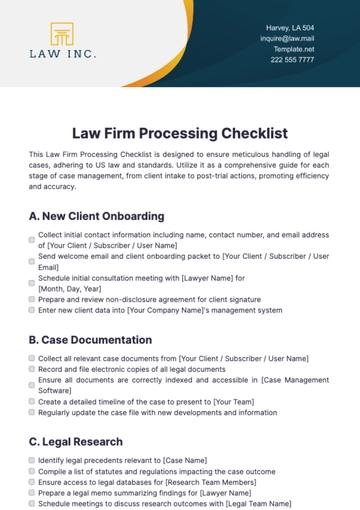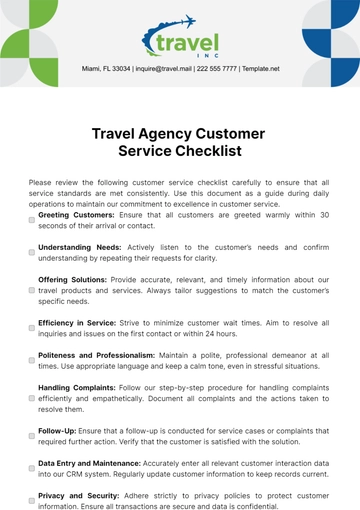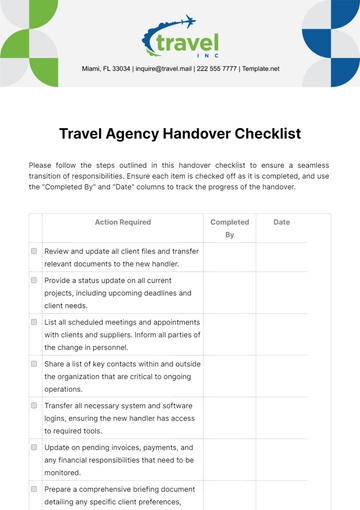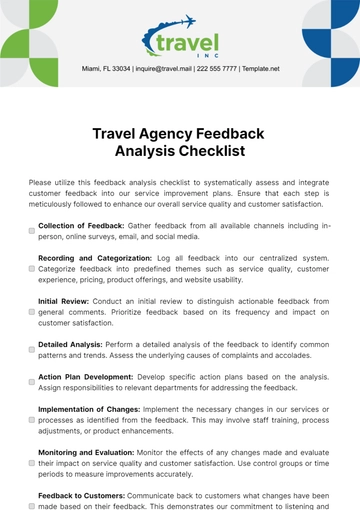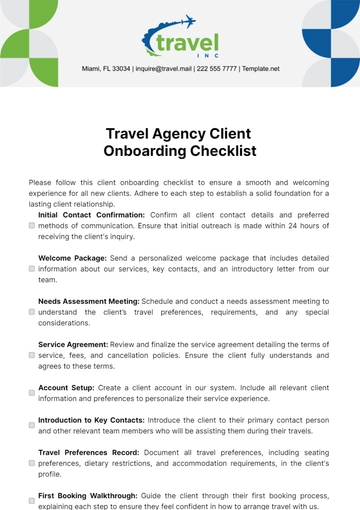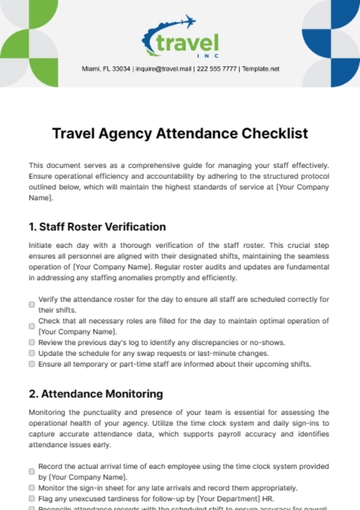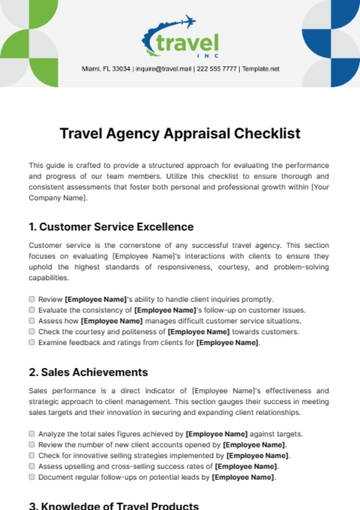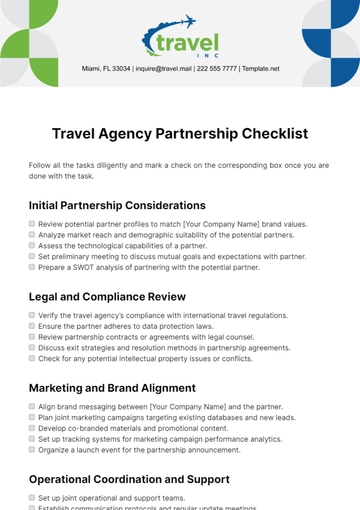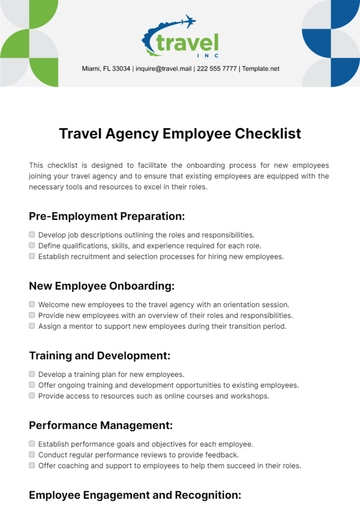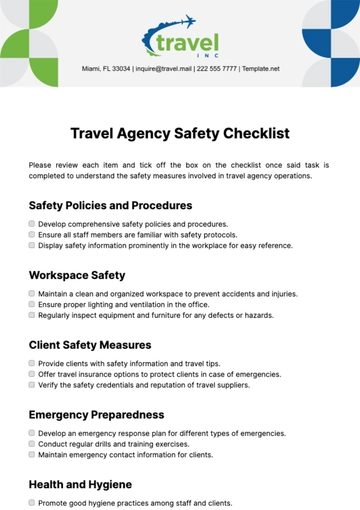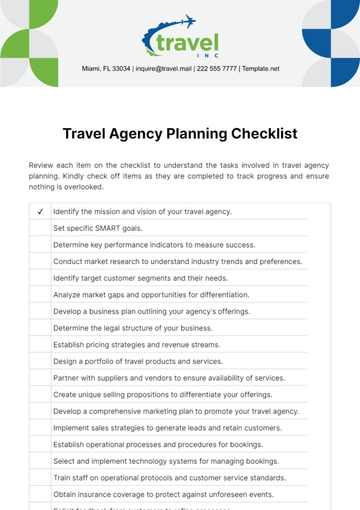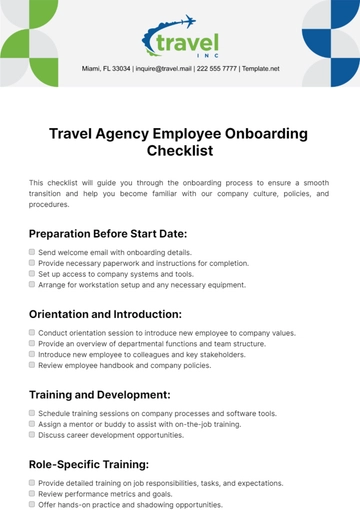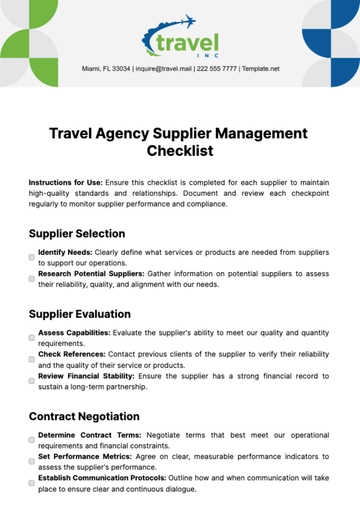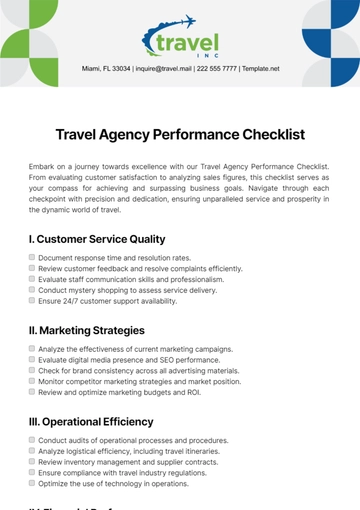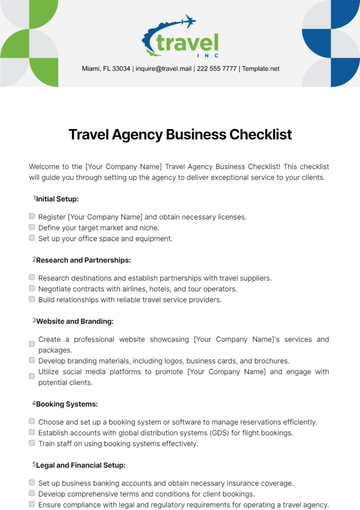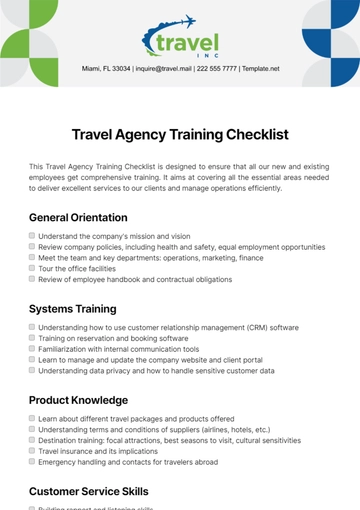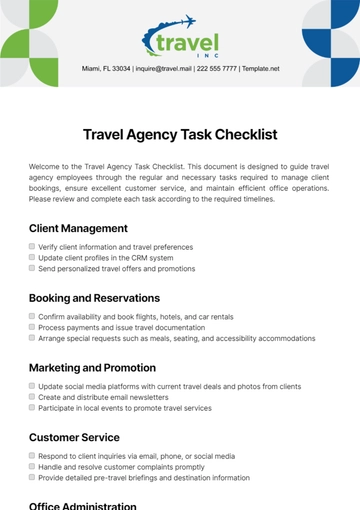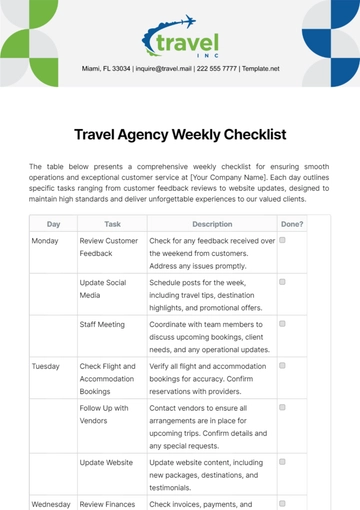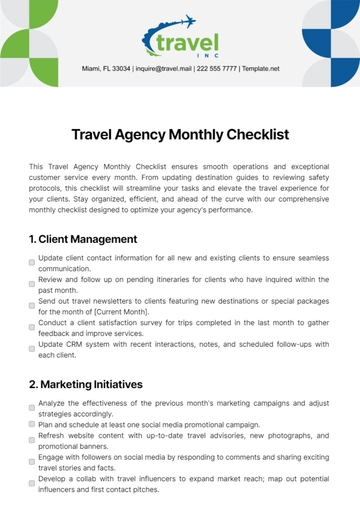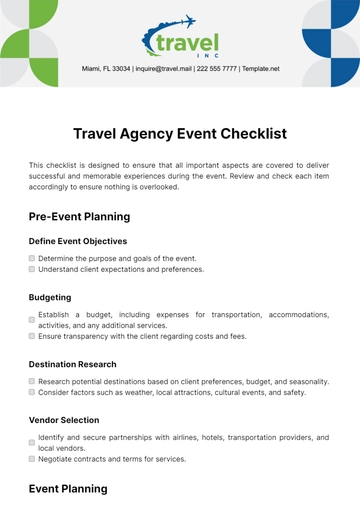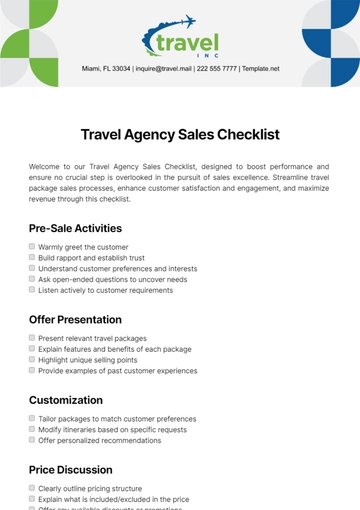Free Travel Agency Financial Checklist
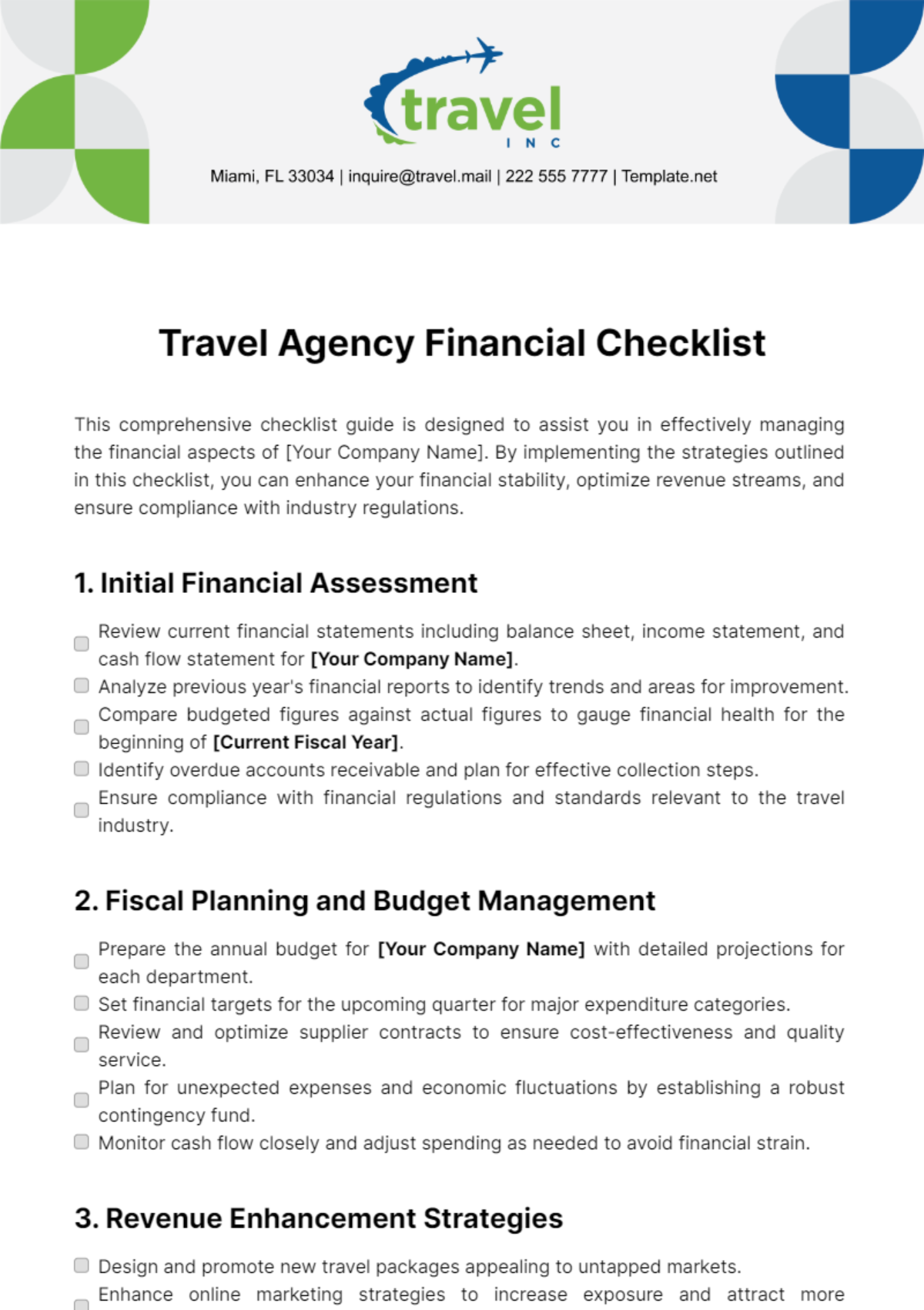
This comprehensive checklist guide is designed to assist you in effectively managing the financial aspects of [Your Company Name]. By implementing the strategies outlined in this checklist, you can enhance your financial stability, optimize revenue streams, and ensure compliance with industry regulations.
1. Initial Financial Assessment
Review current financial statements including balance sheet, income statement, and cash flow statement for [Your Company Name].
Analyze previous year's financial reports to identify trends and areas for improvement.
Compare budgeted figures against actual figures to gauge financial health for the beginning of [Current Fiscal Year].
Identify overdue accounts receivable and plan for effective collection steps.
Ensure compliance with financial regulations and standards relevant to the travel industry.
2. Fiscal Planning and Budget Management
Prepare the annual budget for [Your Company Name] with detailed projections for each department.
Set financial targets for the upcoming quarter for major expenditure categories.
Review and optimize supplier contracts to ensure cost-effectiveness and quality service.
Plan for unexpected expenses and economic fluctuations by establishing a robust contingency fund.
Monitor cash flow closely and adjust spending as needed to avoid financial strain.
3. Revenue Enhancement Strategies
Design and promote new travel packages appealing to untapped markets.
Enhance online marketing strategies to increase exposure and attract more customers.
Partner with other businesses for cross-promotions to extend market reach and boost sales.
Implement loyalty programs to encourage repeat business and customer referrals.
Analyze client feedback and adjust offerings based on demand and satisfaction levels.
4. Cost Control and Expense Reduction
Review all recurring expenses for potential savings, such as subscriptions or memberships.
Negotiate better rates with service providers including but not limited to internet, cleaning, and maintenance services.
Implement energy-saving practices to reduce utility bills in the office of [Your Company Name].
Utilize technology solutions to automate tasks and cut labor costs where viable.
Audit inventory management practices to avoid overstocking and underutilization.
5. Regulatory Compliance and Risk Management
Regularly review and update internal policies to ensure compliance with the latest travel laws and financial regulations.
Conduct internal audits semi-annually to identify and mitigate financial risks.
Stay informed about global events that might impact travel trends and company revenue.
Invest in training for staff on cyber-security and data protection best practices.
Maintain insurance policies sufficient to cover potential operational and liability risks.
By following these guidelines, you can strengthen the financial foundation of your travel agency and position it for sustainable growth and success.
- 100% Customizable, free editor
- Access 1 Million+ Templates, photo’s & graphics
- Download or share as a template
- Click and replace photos, graphics, text, backgrounds
- Resize, crop, AI write & more
- Access advanced editor
Dive into financial organization with Template.net's Travel Agency Financial Checklist Template. This comprehensive tool streamlines your financial management process. Customize expense tracking, revenue monitoring, and budget analysis effortlessly with our AI editor tool. Ensure every aspect of your agency's finances is accounted for, empowering you to make informed decisions and achieve financial success in the travel industry.
You may also like
- Cleaning Checklist
- Daily Checklist
- Travel Checklist
- Self Care Checklist
- Risk Assessment Checklist
- Onboarding Checklist
- Quality Checklist
- Compliance Checklist
- Audit Checklist
- Registry Checklist
- HR Checklist
- Restaurant Checklist
- Checklist Layout
- Creative Checklist
- Sales Checklist
- Construction Checklist
- Task Checklist
- Professional Checklist
- Hotel Checklist
- Employee Checklist
- Moving Checklist
- Marketing Checklist
- Accounting Checklist
- Camping Checklist
- Packing Checklist
- Real Estate Checklist
- Cleaning Checklist Service
- New Employee Checklist
- Food Checklist
- Home Inspection Checklist
- Advertising Checklist
- Event Checklist
- SEO Checklist
- Assessment Checklist
- Inspection Checklist
- Baby Registry Checklist
- Induction Checklist
- Employee Training Checklist
- Medical Checklist
- Safety Checklist
- Site Checklist
- Job Checklist
- Service Checklist
- Nanny Checklist
- Building Checklist
- Work Checklist
- Office Checklist
- Training Checklist
- Website Checklist
- IT and Software Checklist
- Performance Checklist
- Project Checklist
- Startup Checklist
- Education Checklist
- Home Checklist
- School Checklist
- Maintenance Checklist
- Planning Checklist
- Manager Checklist
- Wedding Checklist
- Vehicle Checklist
- Travel Agency Checklist
- Vehicle Inspection Checklist
- Interior Design Checklist
- Backpacking Checklist
- Business Checklist
- Legal Checklist
- Nursing Home Checklist
- Weekly Checklist
- Recruitment Checklist
- Salon Checklist
- Baby Checklist
- Equipment Checklist
- Trade Show Checklist
- Party Checklist
- Hospital Bag Checklist
- Evaluation Checklist
- Agency Checklist
- First Apartment Checklist
- Hiring Checklist
- Opening Checklist
- Small Business Checklist
- Rental Checklist
- College Dorm Checklist
- New Puppy Checklist
- University Checklist
- Building Maintenance Checklist
- Work From Home Checklist
- Student Checklist
- Application Checklist
